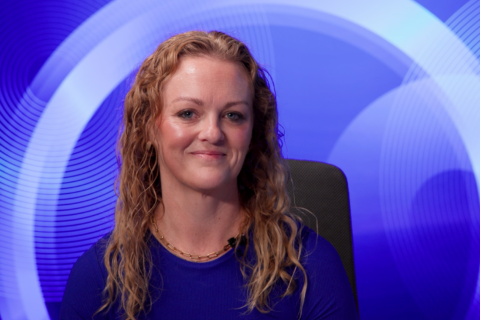November is National Hospice and Palliative Care Month, drawing attention to the vital industry that provides compassionate support to people in the advanced stage of an illness.
Many services provided to such patients can be delivered directly into their home, something that has taken on new significance during the Covid-19 pandemic.
“It’s an opportunity to care for people in the home with a full set of support services that include psychosocial, spiritual and really all aspects of the whole person,” said Tom Koutsoumpas president and CEO of Capital Caring Health.
Capital Caring Health is a nonprofit provider of advanced illness and hospice care serving patients in Maryland, Virginia and Washington, D.C.
“This Covid experience has underscored why it’s important to care for people in their homes,” Koutsoumpas said.
At Capital Caring Health, 95% of patients receive hospice care at home.
“Not only do we have people going in the home but we now use aggressive telehealth to make sure that we have constant communication with patients and families and that’s really been a big change that we didn’t have before,” said Koutsoumpas.
Even before the pandemic hit, Capital Caring Health was developing innovative ways to deliver care directly into homes, launching the “Primary Care at Home” program in January.
The program is designed to provide primary and urgent care to patients at least 65-years-old who have difficulty leaving their home.
“What we really strive for as our goal is to achieve peace of mind for the patient and their family,” said Eric DeJonge, Chief of Geriatrics at Capital Caring Health. “Team-based primary care can deliver medical care, social services and nursing care to that patient at home and make their life and their family’s life much easier.”
The program offers in-home diagnostic tests – such as blood work and X-rays – and 24/7 coordination of care as medical teams are available anytime by phone.
And Capital Caring Health is working to improve access for members of demographics that have been historically underserved by hospice care, creating a Center of Equity, Inclusion and Diversity.
“There are staggering disparities,” said Altonia Garrett, Capital Caring Health’s vice president of public affairs and strategic partnerships. “The programs are there but the utilization is not so we want to raise awareness to the various communities that we serve. It’s a huge opportunity to help raise awareness and understanding about hospice services.”
According to Garrett, 83.2% of white Americans utilize hospice care. The next highest group is African Americans at 8.2% followed by Hispanics at 6.4%, Asians at 2% and Native Americans at 0.5%.
“Our charge is to develop integrative approaches and programs for the diverse populations that we serve and address the health, equality, equity and disparities of care being delivered within our service area,” said Keith Everett, chief officer for performance, compliance, and cultural operations at Capital Caring Health, which is looking internally to see what it can do to better connect with underserved populations.
“We’ll be conducting our own review and assessment to understand our own diversity makeup within our organization so it’s easier for us to provide education to ourselves and our employees and create education for our external parties as well,” said Everett.
With Capital Caring Health being a nonprofit that is primarily supported by Medicare and Medicaid, donations are a central part in how it carries out its mission.
“We rely upon the generosity of individuals, corporations, community groups and foundations to support many special programs that do not get funding from other sources,” said Steve Cone, chief of communications, marketing & philanthropy with Capital Caring Health. “When people donate to us, they are supporting an amazing clinical and counseling staff.”
Some of those special programs include grief counseling for families and individuals and services tailored to veterans, such as the “So No One Dies Alone Program” that pays for air fare and lodging for family members who need to travel to be with their loved one toward the end of their life.
“It’s based solely upon donations from generous folks,” said Cone.
Click here to donate to Capital Caring Health today.









